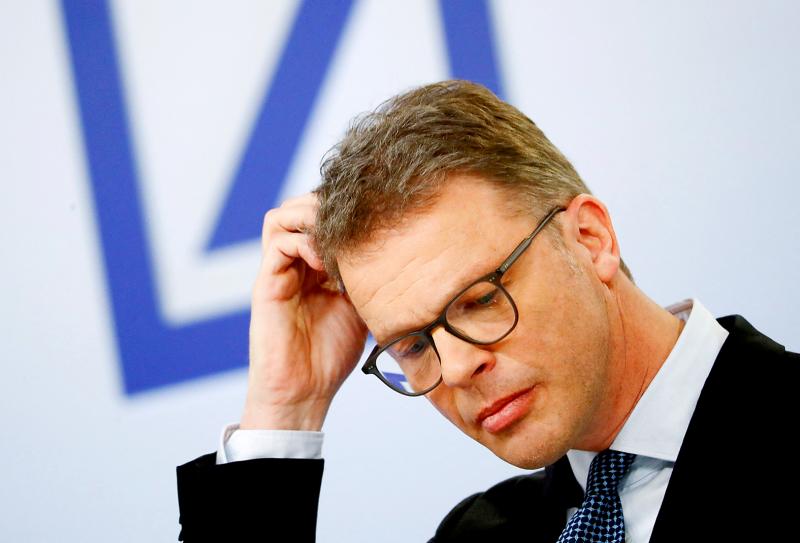Europe’s largest economy is set for contraction on the back of soaring inflation, energy supply bottlenecks and the disruption to global supply chains, Deutsche Bank AG chief executive officer Christian Sewing said yesterday.
“We will no longer be able to avert a recession in Germany,” Sewing said in a speech in Frankfurt, Germany. “We believe that our economy is resilient enough to cope well with this recession — provided the central banks act quickly and decisively now.”
The crisis triggered by Russia’s invasion of Ukraine hit a new peak when Gazprom PJSC this month announced that it is suspending gas flows through its biggest pipeline to Europe indefinitely. The EU is racing to come up with ideas to keep the gas crisis from turning into an economic meltdown, and energy ministers are set for an emergency meeting in Brussels tomorrow.

Photo: Reuters
“The longer inflation remains high, the greater the strain and the higher the potential for social conflict,” Sewing said.
The European Central Bank is set to sharply increase interest rates when it meets today, with economists expecting a rise in the benchmark cost of borrowing of as much as 75 basis points.
Sewing has said that a full stop of Russian gas deliveries would tip Germany into a recession.
Several lenders, including Commerzbank AG, have said they would need to ratchet up credit provisions under the scenario, even though they expect government support to mitigate the hit.
Sewing said he expects an increase in credit defaults to take place eventually, although the lender was not seeing them yet and did not expect them to affect profitability.
Sewing said that supply bottlenecks and the energy crisis had rammed home that Germany needs to limit reliance on other countries.
“We must not allow ourselves to add a further dependency — access to finance — to our current dependencies on gas, raw materials and supply chains,” he said. “We must not leave the playing field, and with it the access to global capital markets, largely to foreign banks.”
European consolidation is needed to achieve that goal, he said.
“The above points are not new, but they are becoming more urgent,” he said.

In Italy’s storied gold-making hubs, jewelers are reworking their designs to trim gold content as they race to blunt the effect of record prices and appeal to shoppers watching their budgets. Gold prices hit a record high on Thursday, surging near US$5,600 an ounce, more than double a year ago as geopolitical concerns and jitters over trade pushed investors toward the safe-haven asset. The rally is putting undue pressure on small artisans as they face mounting demands from customers, including international brands, to produce cheaper items, from signature pieces to wedding rings, according to interviews with four independent jewelers in Italy’s main

Japanese Prime Minister Sanae Takaichi has talked up the benefits of a weaker yen in a campaign speech, adopting a tone at odds with her finance ministry, which has refused to rule out any options to counter excessive foreign exchange volatility. Takaichi later softened her stance, saying she did not have a preference for the yen’s direction. “People say the weak yen is bad right now, but for export industries, it’s a major opportunity,” Takaichi said on Saturday at a rally for Liberal Democratic Party candidate Daishiro Yamagiwa in Kanagawa Prefecture ahead of a snap election on Sunday. “Whether it’s selling food or

CONCERNS: Tech companies investing in AI businesses that purchase their products have raised questions among investors that they are artificially propping up demand Nvidia Corp chief executive officer Jensen Huang (黃仁勳) on Saturday said that the company would be participating in OpenAI’s latest funding round, describing it as potentially “the largest investment we’ve ever made.” “We will invest a great deal of money,” Huang told reporters while visiting Taipei. “I believe in OpenAI. The work that they do is incredible. They’re one of the most consequential companies of our time.” Huang did not say exactly how much Nvidia might contribute, but described the investment as “huge.” “Let Sam announce how much he’s going to raise — it’s for him to decide,” Huang said, referring to OpenAI

Nvidia Corp’s negotiations to invest as much as US$100 billion in OpenAI have broken down, the Wall Street Journal (WSJ) reported, exposing a potential rift between two of the most powerful companies in the artificial intelligence (AI) industry. The discussions stalled after some inside Nvidia expressed concerns about the transaction, the WSJ reported, citing unidentified people familiar with the deliberations. OpenAI makes the popular chatbot ChatGPT, while Nvidia dominates the market for AI processors that help develop such software. The companies announced the agreement in September last year, saying at the time that they had signed a letter of intent for a strategic